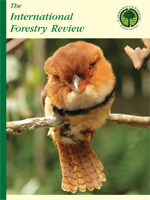Human activities, including international trade and travel, certain forest management policies and practices, and actions that contribute to global climate change, can create conditions favourable for development of forest insect outbreaks. International trade and travel provides numerous opportunities for insects to expand their ranges and become damaging in new locations. Forest management actions leading to fire exclusion can change the character of forests in fire prone ecosystems and increase their susceptibility to insect outbreaks and fires of increased severity. Establishment of plantations of exotic trees provides an abundance of host material for both introduced insects and indigenous species that can adapt to the new hosts. Special classifications, such as national parks and wilderness, which preclude timber harvesting or pest management, can, over time, result in large areas of mature/overmature forests, susceptible to outbreaks. Global climate change can lead to range expansions of forest insect pests accompanied by new host associations, occurrence of outbreaks in new locations, outbreaks of increased severity and of longer duration and changes in outbreak cycles.
How to translate text using browser tools
1 June 2015
The Role of Human Activities on Forest Insect Outbreaks Worldwide
W.M. Ciesla
ACCESS THE FULL ARTICLE

International Forestry Review
Vol. 17 • No. 3
September 2015
Vol. 17 • No. 3
September 2015




